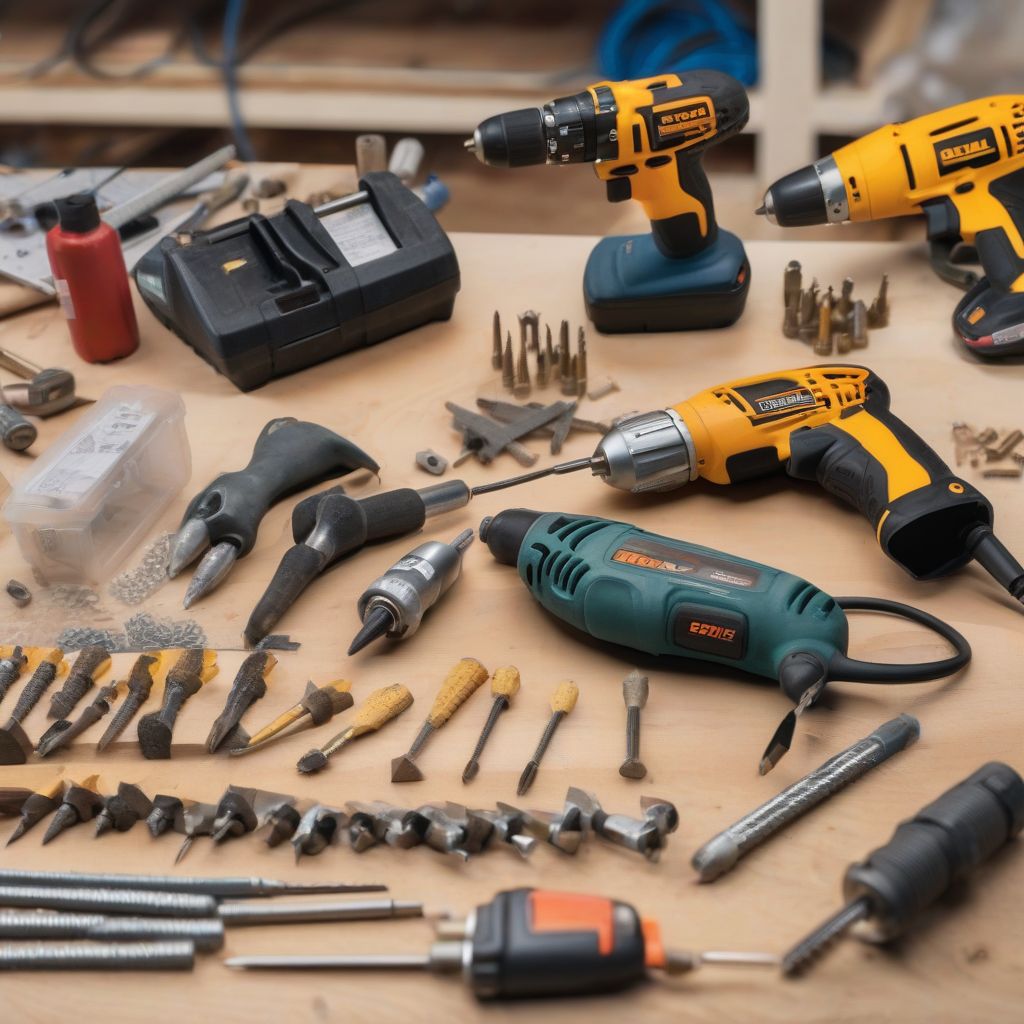Ever dreamt of effortlessly crafting that perfect bookshelf or finally hanging those family photos without a hitch? The right drill can transform your DIY dreams into reality. But with so many options available, choosing the perfect drill can feel overwhelming. This guide will equip you with the knowledge to confidently select the ideal drill for all your DIY projects, from simple tasks to ambitious builds.
Understanding Your DIY Needs
Before diving into drill types, assess your projects. What materials will you be working with most? Wood, metal, concrete? How often will you be using the drill? Answering these questions will guide your decision-making process. As a nutritionist, I often compare choosing the right tool to selecting the right ingredients for a healthy meal. Just as different ingredients serve different purposes, various drills excel in specific applications.
Occasional Use vs. Frequent Projects
For occasional DIY tasks like hanging pictures or assembling furniture, a basic cordless drill might suffice. However, if you’re tackling larger projects or renovations, investing in a more powerful and versatile drill is worthwhile. “A good workman never blames his tools,” but having the right tools undoubtedly makes the job smoother and more enjoyable.
Materials and Surfaces
Consider the materials you’ll be working with. Drilling into concrete requires a hammer drill with more power and durability than a drill designed for wood. Likewise, working with metal often necessitates variable speed control for optimal performance.
Types of Drills: A Comprehensive Overview
The market offers a variety of drills, each designed for specific applications. Understanding their strengths and weaknesses is crucial for making the right choice.
Cordless Drills
Cordless drills offer portability and convenience, making them perfect for tasks around the house and garden. They are powered by rechargeable batteries, providing freedom from power outlets. However, battery life can be a limiting factor for extensive projects.
Corded Drills
Corded drills provide consistent power and are ideal for heavy-duty tasks. They are generally more affordable than cordless drills with comparable power. However, their reliance on a power outlet can limit their reach.
Hammer Drills
Hammer drills excel at drilling into masonry and concrete. They deliver a pounding action alongside rotation, effectively breaking through tough materials. However, the hammering action can be excessive for delicate materials like wood.
Impact Drivers
Impact drivers specialize in driving screws and fasteners quickly and efficiently. They use both rotational and concussive blows, preventing cam-out and stripping screws. While not ideal for drilling holes, they are indispensable for projects involving lots of screws.
Drill Drivers
Drill drivers combine the functionality of a drill and an impact driver, offering versatility for various tasks. They can drill holes and drive screws, making them a valuable all-in-one tool.
Key Features to Consider
Beyond the basic drill types, several key features influence a drill’s performance and suitability for your DIY projects.
Power and Speed
Power, often measured in volts for cordless drills and amps for corded drills, determines the drill’s ability to handle tough materials. Speed, measured in revolutions per minute (RPM), affects drilling and driving efficiency.
Chuck Size
The chuck size determines the maximum diameter of drill bits the drill can accommodate. Common chuck sizes include 3/8 inch and 1/2 inch. A larger chuck size allows for greater versatility.
Clutch Settings
The clutch controls the torque applied when driving screws, preventing over-tightening and stripping. Multiple clutch settings provide greater control for different materials and screw sizes.
Ergonomics and Comfort
A comfortable grip and balanced weight are essential for extended use. Look for drills with ergonomic designs that minimize fatigue during prolonged projects. As someone focused on health and wellness, I can’t stress enough the importance of comfortable tools to prevent strain and injury.
Choosing the Right Drill for Your Needs
Choosing the right drill involves matching your project requirements with the drill’s capabilities. Consider the frequency of use, materials you’ll be working with, and essential features like power, speed, and chuck size. “Measure twice, cut once” applies equally to tool selection; choosing the right drill from the outset will save you time and frustration down the road.
 Choosing the Right Drill
Choosing the Right Drill
For the occasional DIYer, a versatile cordless drill driver with a 3/8 inch chuck might be perfect. For frequent and demanding projects, investing in a powerful corded drill or a dedicated hammer drill for masonry work is a wise decision. If your projects involve lots of screws, an impact driver is a valuable addition to your toolkit. “The best tools are those that do the job well,” and selecting the right drill will empower you to complete your DIY projects with precision and efficiency.
Choosing Reliable Tool Brands
Selecting tools from reputable brands often ensures quality, durability, and access to customer support. Researching different brands and reading reviews can help you make informed decisions. You can find more information about reliable tool brands on our article “The Most Reliable Tool Brands for Home Improvement Projects.” For beginners, we recommend checking out our guide on “The Best Tool Sets for Beginners and Advanced DIYers.”
If you are looking to enhance your DIY capabilities with power tools, you might find our article “The Best Power Tools Every DIYer Should Own” informative. And if you are a beginner, our article “The Best Tools Every Beginner DIYer Should Have” can provide you with a solid foundation. For those interested in the flexibility of cordless tools, “The Best Cordless Tools for Mobile and Outdoor DIY Work” offers valuable insights.
Conclusion
Choosing the right drill is a crucial step in any DIY journey. By understanding your project needs, the various drill types available, and the key features that influence performance, you can confidently select the ideal tool for the job. Remember, investing in the right drill not only makes your DIY projects easier but also ensures they are completed efficiently and safely. Now, it’s time to power up your DIY dreams! Share your own drill selection tips and project experiences in the comments below. We’d love to hear from you!



